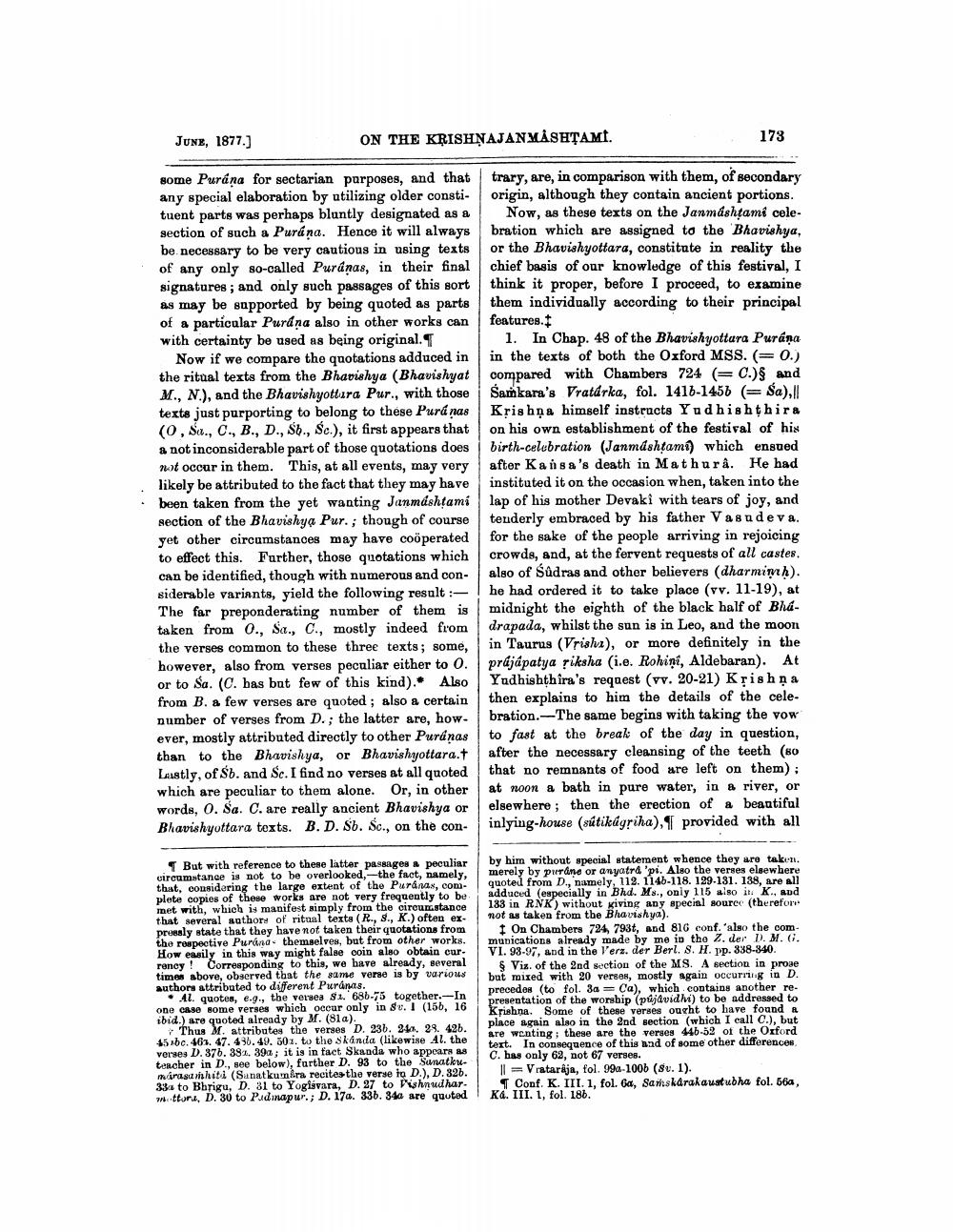________________
ON THE KRISHNAJANMASHTAMI
JUNE, 1877.]
some Purána for sectarian purposes, and that any special elaboration by utilizing older constituent parts was perhaps bluntly designated as a section of such a Purána. Hence it will always be necessary to be very cautious in using texts of any only so-called Puranas, in their final signatures; and only such passages of this sort as may be supported by being quoted as parts of a particular Purána also in other works can with certainty be used as being original.¶
Now if we compare the quotations adduced in the ritual texts from the Bhavishya (Bhavishyat M., N.), and the Bhavishyottura Pur., with those texts just purporting to belong to these Purá nas (0, Sa., C., B., D., Sb., Sc.), it first appears that a not inconsiderable part of those quotations does not occur in them. This, at all events, may very likely be attributed to the fact that they may have been taken from the yet wanting Janmashtami section of the Bhavishya Pur.; though of course yet other circumstances may have coöperated to effect this. Further, those quotations which can be identified, though with numerous and considerable variants, yield the following result: The far preponderating number of them is taken from O., Sa., C., mostly indeed from the verses common to these three texts; some, however, also from verses peculiar either to O. or to Sa. (C. has but few of this kind). Also from B. a few verses are quoted; also a certain number of verses from D.; the latter are, however, mostly attributed directly to other Puránas than to the Bhavishya, or Bhavishyottara.+ Lastly, of Sb. and Sc. I find no verses at all quoted which are peculiar to them alone. Or, in other words, O. Sa. C. are really ancient Bhavishya or Bhavishyottara texts. B. D. Sb. Sc., on the con
But with reference to these latter passages a peculiar circumstance is not to be overlooked,-the fact, namely, that, considering the large extent of the Puranas, complete copies of these works are not very frequently to be. met with, which is manifest simply from the circumstance that several authors of ritual texts (R., S., K.) often expressly state that they have not taken their quotations from the respective Purána themselves, but from other works. How easily in this way might false coin also obtain currency Corresponding to this, we have already, several times above, observed that the same verse is by various authors attributed to different Puranas.
Al. quotes, e.g., the verses S1. 686-75 together.-In one case some verses which occur only in sv. I (15b, 16 ibid.) are quoted already by M. (81a).
Thus M. attributes the verses D. 23b. 24. 23. 42b. 45bc. 463. 47. 436. 49. 50%. to the skânda (likewise Al. the verses D. 376. 382. 39a; it is in fact Skanda who appears as teacher in D., see below), further D. 93 to the Sanatku márasamhita (Sanatkumira recites the verse to D.), D. 326. 33a to Bhrigu, D. 31 to Yogisvara, D. 27 to Vishnudharmettora, D. 30 to Padmapur.; D. 17a. 336. 34a are quoted
173
trary, are, in comparison with them, of secondary origin, although they contain ancient portions.
Now, as these texts on the Janmashtami celebration which are assigned to the Bhavishya, or the Bhavishyottara, constitute in reality the chief basis of our knowledge of this festival, I think it proper, before I proceed, to examine them individually according to their principal features.
1. In Chap. 48 of the Bhavishyottara Purana in the texts of both the Oxford MSS. (= 0.) compared with Chambers 724 (=C.)§ and Samkara's Vratárka, fol. 1416-1456 (Sa),|| Krishna himself instructs Yudhishthira on his own establishment of the festival of his birth-celebration (Janmashtami) which ensued after Kaisa's death in Mathura. He had instituted it on the occasion when, taken into the lap of his mother Devaki with tears of joy, and tenderly embraced by his father Vasudeva. for the sake of the people arriving in rejoicing crowds, and, at the fervent requests of all castes. also of Sûdras and other believers (dharminch). he had ordered it to take place (vv. 11-19), at midnight the eighth of the black half of Bhádrapada, whilst the sun is in Leo, and the moon in Taurus (Vrishi), or more definitely in the prájápatya riksha (i.e. Rohini, Aldebaran). At Yadhishthira's request (vv. 20-21) Krishna then explains to him the details of the celebration. The same begins with taking the vow to fast at the break of the day in question, after the necessary cleansing of the teeth (80 that no remnants of food are left on them); at noon a bath in pure water, in a river, or elsewhere; then the erection of a beautiful inlying-house (sútikágriha), provided with all
by him without special statement whence they are taken. merely by purane or anyatra 'pi. Also the verses elsewhere quoted from D., namely, 112. 1146-118. 129-131. 138, are all adduced (especially in Bhd. Ms., only 115 also in K., and 133 in RNK) without giving any special source (therefor not as taken from the Bhavishya).
On Chambers 724, 793t, and 816 conf. also the communications already made by me in the Z. der D. M. G. VI. 93-97, and in the l'erz. der Berl. S. H. pp. 338-340.
§ Viz. of the 2nd section of the MS. A section in prose but mixed with 20 verses, mostly again occurring in D. precedes (to fol. 3a Ca), which contains another representation of the worship (pujavidhi) to be addressed to Krishna. Some of these verses ought to have found a place again also in the 2nd section (which I call C.), but are wanting; these are the verses 446-52 of the Oxford text. In consequence of this and of some other differences.. C. has only 62, not 67 verses.
| Vrataraja, fol. 99a-100b (sv. 1).
Conf. K. III. 1, fol. 6a, Samskarakaustubha fol. 56a, Ká. III. 1, fol. 186.




